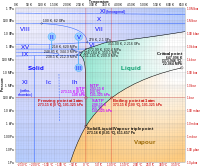
Photo from wikipedia
Abstract Hydration of water affects the dynamics and in turn the activity of biomacromolecules. We investigated the dependence of the librational oscillations and the dynamical transition on the hydrating conditions… Click to show full abstract
Abstract Hydration of water affects the dynamics and in turn the activity of biomacromolecules. We investigated the dependence of the librational oscillations and the dynamical transition on the hydrating conditions of two globular proteins with different structure and size, namely β-lactoglobulin (βLG) and human serum albumin (HSA), by spin-label electron paramagnetic resonance (EPR) in the temperature range of 120–270 K. The proteins were spin-labeled with 5-maleimide spin-label on free cysteins and prepared in the lyophilized state, at low (h = 0.12) and full (h = 2) hydration levels in buffer. The angular amplitudes of librations are small and almost temperature independent for both lyophilized proteins. Therefore, in these samples, the librational dynamics is restricted and the dynamical transition is absent. In the small and compact beta-structured βLG, the angular librational amplitudes increase with temperature and hydrating conditions, whereas hydration-independent librational oscillations whose amplitudes rise with temperature are recorded in the large and flexible alpha-structured HSA. Both βLG and HSA at low and fully hydration levels undergo the dynamical transition at about 230 K. The overall results indicate that protein librational dynamics is activated at the low hydration level h = 0.12 and highlight biophysical properties that are common to other biosamples at cryogenic temperatures.
Journal Title: Biomolecular Concepts
Year Published: 2022
Link to full text (if available)
Share on Social Media: Sign Up to like & get
recommendations!